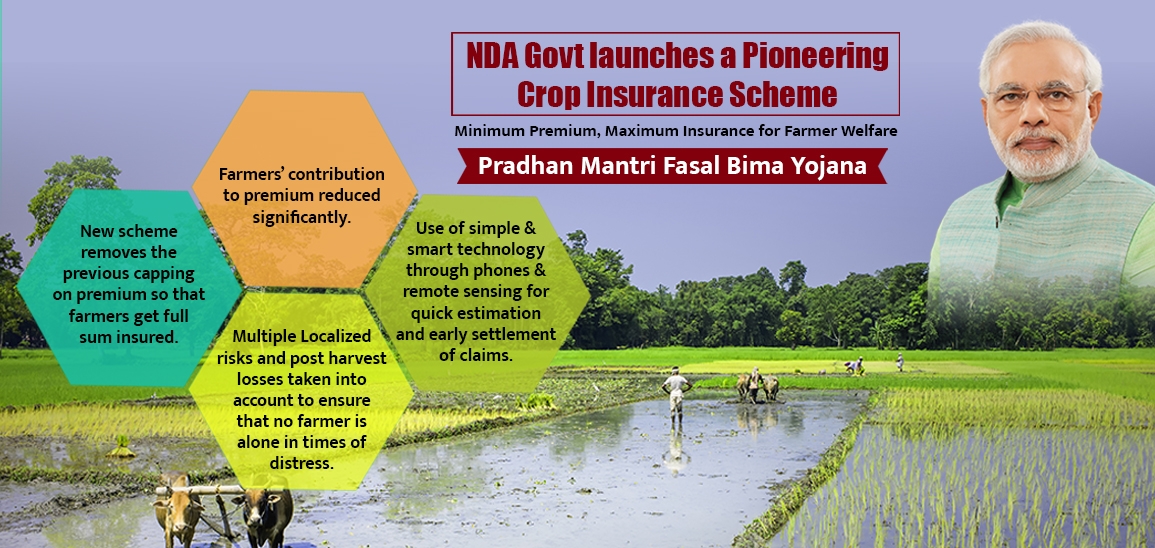New Crop Insurance Scheme: Succor for Indian Farmers
- In Economics
- 08:53 AM, Feb 15, 2016
- Dr. Yadu Singh
Pradhan Mantri Fasal Bima Yojana (PMFBY), a new Crop Insurance Scheme, was announced in New Delhi on the day of Makar Sankranti, 14th January, 2016. The Cabinet gave its approval for the scheme a day earlier. It is a life changing plan for Indian farmers.
It replaces NAIS (National Agriculture Insurance Scheme) and MNAIS (Modified National Insurance Scheme), which were not being utilized by farmers due to multiple inherent deficiencies, including higher premium rates.
PMFBY will be implemented from the coming Kharif (Monsoon) season. The premium rate for Kharif crops is only 2% and for Rabi (Winter) Crops will be only 1.5%. Commercial and horticultural crops will attract 5% premium. These are the most economical premium for crops in India.
Unlike previous schemes, where Premium could be as high as 15% and assured amount was capped, PMFBY is a boon for farmers not only because premium is very low but also because it mandates use of newer technology like Satellites and smart phones to make a more complete and accurate assessment of the loss of crop in shorter period and at a more localized level. Using the new technology, and in due course, it can reach even at the farm level.
Beyond 2% and 1.5% premium rates for Kharif and Rabi crops respectively, the balance of the Insurance premium will be paid by Central Government and State Governments on 50:50 basis.
Currently, only 23% of crops in India are insured. This is likely to go up significantly. Government’s goal is 50% in 3 years, but I suspect its acceptance among farmers will grow very quickly and it will reach much higher level soon. Knowing the farming sector in India well due to my origin in a farming family in Bundelkhand, India, and after having discussed the PMFBY with many farmers, I don’t think there will be any difficulty in achieving 50% crop coverage in 2 years, as desired by Prime Minister in his recent Mann Ki Baat Radio address a few days ago.
Financial liability for the Government for the current 23% crop coverage is Rs 31,000 crores. It will go up to Rs 57,000 crores when the crop coverage is 30%. At 50% crop coverage, this liability will Rs 88,000 crores.
India is predominantly an agricultural country, with about 60% of its people depending on agriculture for their living and income. Except for a few farmers, most of the people involved in farm-based activities have low and unpredictable income. Crop failure leads to destitution and precarious economic situation. Crops fail due to natural disasters including hail storms, excessive rains or droughts. They don’t seem to have a way out with failure of crops after they have invested in seeds, irrigation, insecticide and labour, and have hardly anything as a way of savings. The desperation and destitution end up forcing many farmers to commit suicide. It is reported that 3000 farmers in India have committed suicide over the last 3 years. Failure of crops affect them in multiple ways.
I have returned to Sydney recently from the Bundelkhand region of Uttar Pradesh, which is notorious for unpredictable rains, droughts and farmers’ suicides. It has been reported that approximately 50 farmers have committed suicide there over the last 12 months. Things were not looking good in Bundelkhand this year too, after continuous crops’ failure over the last 2 years. There is an ongoing drought there this year too. Farmers in regions like Bundelkhand need urgent help, starting immediately.
PMFBY should be reviewed annually and deficiencies thus detected should be rectified quickly. Like the Uttar Pradesh Government’s scheme of Rs 5 Lacs insurance money for farmers if they die an unnatural death, PMFBY too should have some provision of this nature.
PMFBY is really a Life-saving scheme (Amrit Yojna) as stated by Agriculture Minister, Mr. Radha Mohan Singh. It is indeed a historic scheme for farmers, as described by Home Minister, Mr. Rajnath Singh. I have no doubt that PMFBY will prove to be a boon for farmers.
PMFBY is a revolutionary scheme for the interest of farming sector in India, for which the Prime Minister, Mr. Narendra Modi deserves gratitude and congratulations.







Comments